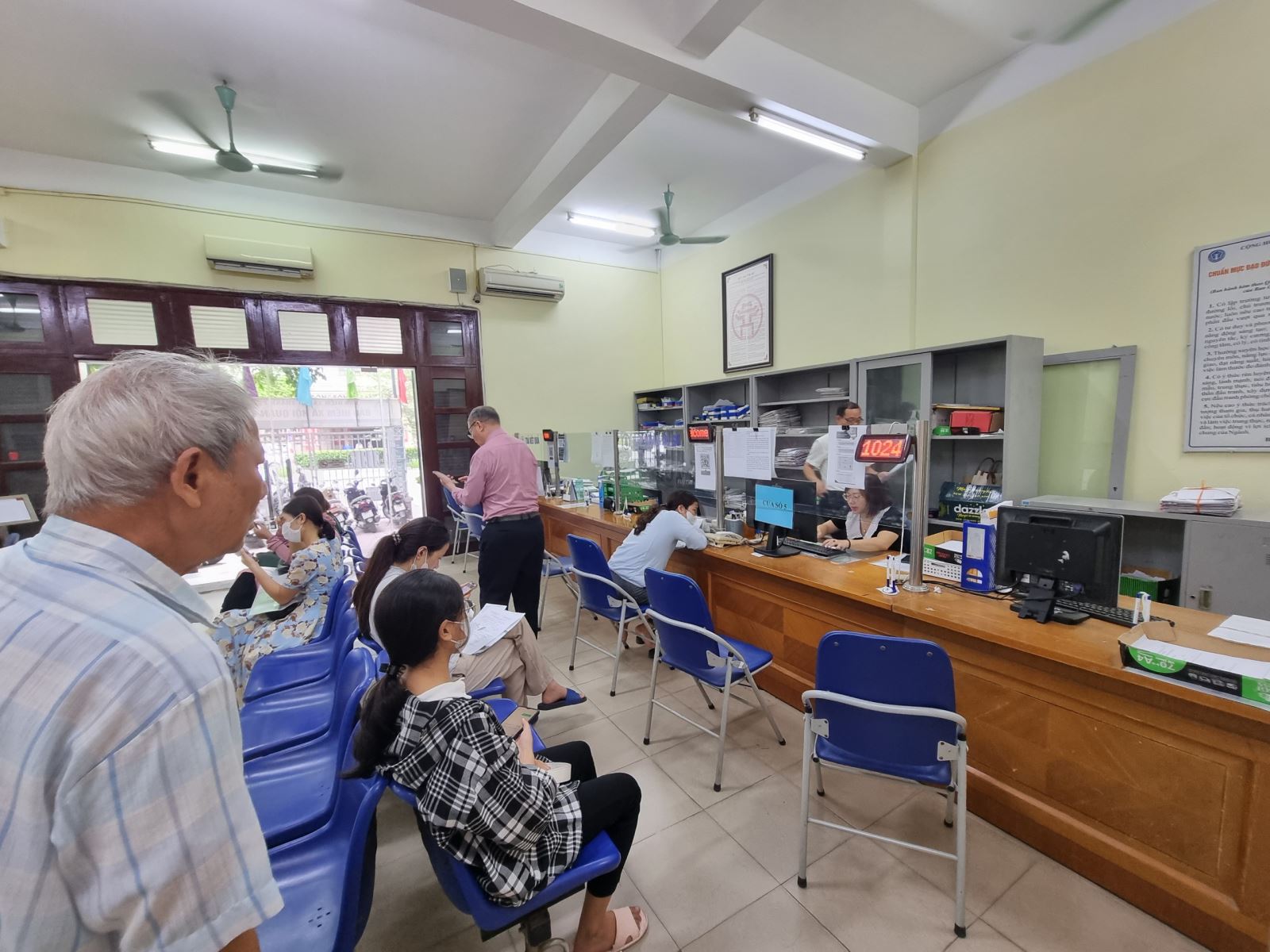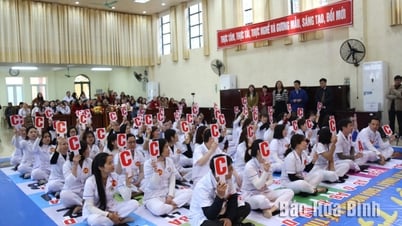According to Vietnam Social Security, this regulation applies to those who have participated in social insurance before the revised Social Insurance Law takes effect.
Pay social insurance for 15 years to receive pension
The 2024 Social Insurance Law stipulates that employees who reach retirement age and have paid social insurance for 15 years or more will receive a monthly pension. This provision is intended to create opportunities for those who start participating in social insurance late, or participate intermittently, to accumulate 15 years of contributions (instead of 20 years as stipulated in the 2014 Social Insurance Law) to receive a monthly pension instead of receiving a lump sum of social insurance.
People come to do transactions at the 'one-stop' department of the Social Insurance of Cau Giay district, Hanoi . Photo: XC
In case the employee has paid social insurance for more than 15 years, he/she will receive a higher pension rate due to the long-term social insurance payment. Specifically, regarding the monthly pension, for female employees, it is equal to 45% of the average salary used as the basis for social insurance payment, corresponding to 15 years of social insurance payment, then 2% is added for each additional year of payment, up to a maximum of 75%. For male employees, it is equal to 45% of the average salary used as the basis for social insurance payment, corresponding to 20 years of social insurance payment, then 2% is added for each additional year of payment, up to a maximum of 75%. In case the male employee has paid social insurance for 15 years but less than 20 years, the monthly pension is equal to 40% of the average salary used as the basis for social insurance payment, then 1% is added for each additional year of payment.
On the other hand, this provision of the amended Social Insurance Law is also attractive, encouraging employees to maintain the period of social insurance payment to receive pension, contributing to reducing the number of people withdrawing social insurance at one time. From there, creating opportunities for all employees when they reach retirement age to have a stable income from pension and have a free health insurance card for health care.
What to do when you have not paid for 15 years?
Firstly, in case the employee is not eligible for retirement (less than 15 years of social insurance contributions), he/she should continue to participate in social insurance to have the opportunity to enjoy higher benefits such as: When continuing to participate in social insurance, the employee will enjoy higher benefits because the benefits are calculated based on the contribution period such as sickness, work accident, occupational disease, etc.
Enjoy pension with easier conditions (the minimum number of years of contribution to receive pension is 15 years instead of 20 years as per current regulations);
During the pension period, the beneficiary also receives health insurance contributions from the Social Insurance Fund and medical examination and treatment fees to take care of their health when they retire.
Second, in case the social insurance participant has reached retirement age (but has not yet paid social insurance for 15 years to receive pension) and has not yet reached the age to receive social pension, if he/she does not receive one-time social insurance and does not reserve the time of social insurance payment but has a request, he/she will receive the following regime: Receive monthly allowance from his/her own social insurance payment. The duration and level of monthly allowance are determined based on the payment period and salary used as the basis for social insurance payment of the employee. The lowest monthly allowance is equal to the social pension allowance.
During the period of receiving monthly benefits, the beneficiary receives health insurance from the state budget; when the beneficiary dies, relatives are entitled to a one-time benefit for the months not yet received and a funeral benefit if they meet the prescribed conditions.
According to Baotintuc.vn
Source: https://baohoabinh.com.vn/274/200148/Dong-BHXH-chua-du-15-nam,-nguoi-lao-dong-nen-lam-gi-de-huong-luong-huu.htm



![[Photo] More than 17,000 candidates participate in the 2025 SPT Competency Assessment Test of Hanoi National University of Education](https://vphoto.vietnam.vn/thumb/1200x675/vietnam/resource/IMAGE/2025/5/17/e538d9a1636c407cbb211b314e6303fd)
![[Photo] Prime Minister Pham Minh Chinh chairs meeting on science and technology development](https://vphoto.vietnam.vn/thumb/1200x675/vietnam/resource/IMAGE/2025/5/17/ae80dd74c384439789b12013c738a045)

![[Photo] Readers line up to visit the photo exhibition and receive a special publication commemorating the 135th birthday of President Ho Chi Minh at Nhan Dan Newspaper](https://vphoto.vietnam.vn/thumb/1200x675/vietnam/resource/IMAGE/2025/5/17/85b3197fc6bd43e6a9ee4db15101005b)






















![[Photo] Nearly 3,000 students moved by stories about soldiers](https://vphoto.vietnam.vn/thumb/1200x675/vietnam/resource/IMAGE/2025/5/17/21da57c8241e42438b423eaa37215e0e)






































































Comment (0)